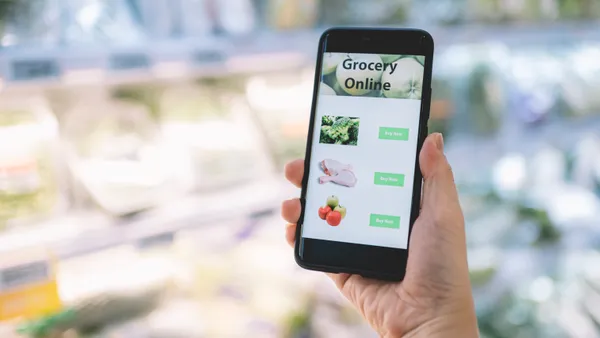Dive Brief:
- Concern about rising food prices has overtaken fear of catching COVID-19 among consumers in the United States, with people perceiving inflation to be significantly higher than it actually is, according to findings released Monday from the latest wave of Dunnhumby's Consumer Pulse Survey.
- Walmart was the top choice among shoppers in the survey when they were asked which grocery store provides the best value for money, with 54% of respondents naming the retailer. Aldi was next, with an 18% share, followed by Kroger and Amazon, which both were the choice of 10% of survey participants.
- Grocery costs are weighing on shoppers as inflation surges against a backdrop of fast-declining COVID-19 cases across the country.
Dive Insight:
Dunnhumby's survey underscores the high sensitivity of consumers to the cost of keeping their homes stocked with food. Fifty-one percent of respondents to the study indicated they feel their spending power at the grocery store has eroded as prices rise, up 10 percentage points since September, when the research firm last fielded its periodic Consumer Pulse Survey.
In a sign of how deeply galloping inflation is impacting shoppers, the poll found that people believe inflation has hit an annual rate of 17.7%, more than twice as high as it actually is. Shoppers described as "value seekers" thought inflation was higher than people who didn't fall into that category.
In addition to overwhelmingly selecting Walmart as the most economical source of groceries, people in the survey were also partial to the retailer as a source of nutritious products. Fifty-four percent of respondents cited Walmart when quizzed about where they find the widest selection of healthy food, while 18% of participants mentioned Whole Foods. Kroger and Amazon each garnered a 10% share, tying them for third place.
The survey, which was conducted from Jan. 25 to Feb. 8 and brought in responses from 400 participants in each of 23 countries, also found that Americans have become much less worried about the risks posed by COVID-19.
Dunnhumby's "Worry Index," a gauge of people's concern about the impact of the virus over time, dropped to 13% in the latest iteration of the research, down from 17% during late August and September, when the survey was last conducted. The index, launched shortly after the pandemic began in March 2020, peaked at 32% in November of that year.
Dunnhumby's research also found that online grocery shopping remains popular among consumers. Fifty-five percent of respondents in the latest round of the research said they had bought groceries through an e-commerce channel at least once during the past week, about the same level seen in July 2020. The figure came in at 38% when Dunhumby first ran the Consumer Pulse Survey between March 29 and April 1, 2020.
In addition, people are growing more satisfied with their experience buying groceries online even as their satisfaction with in-store shopping has declined during the pandemic, according to the research. Thirty-nine percent of respondents said they felt satisfied with the in-store shopping experience, while 36% felt that way about grocery e-commerce channels.













